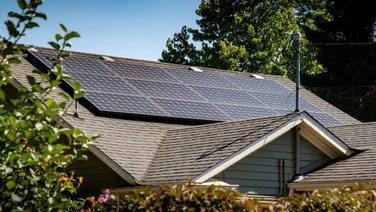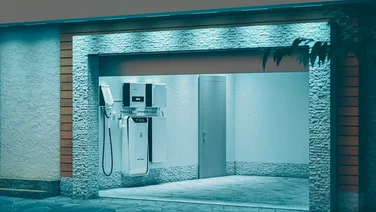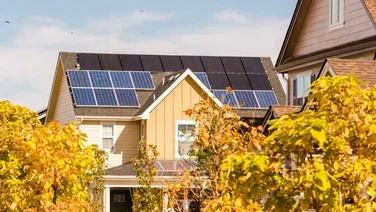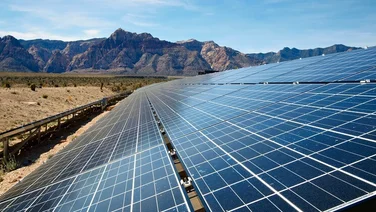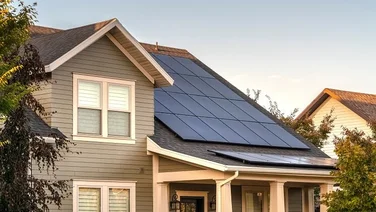✔ Solar panels increase property value by up to 4.1%, on average
✔ New Jersey is the best state to sell a property with solar panels on
✔ Energy efficiency is increasingly important for American homebuyers
More than three million US homes now have solar panels – and this is increasing at a rate of 32% every year (National Renewable Energy Laboratory, 2022)
Solar panels decrease energy bills, reduce reliance on the grid, and help shrink carbon emissions, so we can see why so many US citizens are adopting them.
But how do solar panels affect the value of a home? We’ve answered that in the article below, also covering which US states see the biggest increase in value, and whether it’s okay to move house just after buying solar panels.

Do solar panels improve your property’s value?
Yes, solar panels can increase your property’s value by up to 4.1%, on average. This is because energy efficiency is now a big factor for many Americans when it comes to buying a home.
After all, who wouldn’t want a home that not only saves you money on bills, but also helps save the planet too?
Are there any studies that prove this?
A study by real estate company Zillow found that 67% of homebuyers viewed energy efficiency as “very important”, making properties with solar panels already installed on them much more appealing than ones without.
Zillow also found in 2019 that solar panels on a home will increase its value by 4.1%, which translates to $9,274 for the typical median-valued property.
An older study done in California found that solar panels added 3.5% to a property’s value, increasing to more in liberal areas.
On top of this, the US Department of Energy’s Lawrence Berkeley National Laboratory discovered that people would pay an extra $15,000 for a solar-powered home.
Additionally, the National Renewable Energy Laboratory (NREL) says that the value of your home increases by $20 for every $1 you save on energy bills. And wouldn’t you know, solar panels are great at shaving money off of your monthly energy costs.
So if your solar panel system saved you $700 a year, you’d add an impressive $14,000 to its sale value.
Are there any studies that suggest solar panels don’t improve property value?
There’s limited up-to-date research that suggests solar panels will decrease a property’s value.
Adding solar panels isn’t guaranteed to increase its value, but it’s likely to in today’s market. This is because rising energy costs mean people are willing to pay more for energy security. After all, sunlight is a free, unlimited source of energy that’ll exist for another five billion years or so.

How do solar panels increase the value of your home?
It’s probably not surprising, but the main reason solar panels increase the value of your home is because they provide cheaper electricity.
Solar panels help their owners shrink their electricity bills – and, if you combine them with a solar battery, could even eliminate bills entirely.
Another reason is because homebuyers get a solar panel system ready and raring to go — they don’t need to worry about the buying and installation phase because the system is already there.
In which US states do solar panels add the most value to properties?
The amount of value solar panels can add to your home depends on which state you’re selling in. The increase in value aligns well with the states that typically have high real estate costs.
Here are the best states to sell a home with solar panels in:
California: The Golden State is well known for its high property prices — and it’s no different when it comes to selling a home with solar panels on it. You can expect solar panels to add around 4.4% to your home’s value if you’re selling in California. You could make even more if your property is in San Francisco — around 5.1%, to be specific.
Hawaii: Adding solar panels to a home in Hawaii can boost the price by as much as 4% — and that’s on top of its already pricy real estate. That’s less than California’s average, but the 4% goes a long way — adding an average of $24,526 to a property’s value. Mahalo nui loa to solar panels, right?
New York: Is it any surprise that the Big Apple makes this list? Prices — and spaces to live — are already at a premium in New York City. And adding solar panels will boost the value of a home here by $23,989, but this can climb much higher if you’re selling in the really exclusive areas.
New Jersey: This state takes the crown of the best place to sell a home with solar panels on. Adding a solar panel system to a property in New Jersey will add an astronomical 9.9% to the value, or around $32,281.
Is it okay to move house shortly after buying solar panels?
There’s nothing wrong with selling your home shortly after buying and installing solar panels, but the upfront cost of a solar panel might mean it’s not worth it.
You’ll pay an average of $16,000 for a solar panel system, and with homebuyers willing to pay around $15,000 more for a solar powered home, you’ll immediately be $1,000 short.
However, you don’t want to wait too long to sell a home with solar panels — outdated systems or those in poor condition could actually end up deterring buyers.
Keep on top of this by making sure your solar panels are regularly cleaned and maintained, and consider replacing your solar panel system if it’s 15 years old or more. Solar panels will last 25 years or more, but it’s still worth replacing after 15 years if you’re selling your home.
You can always take your solar panels with you to a new home, but generally it’s not ideal because you’ll have to pay for transport and to get them installed again.
Summary
Solar panels clearly make homes more attractive to prospective buyers, so they’re worth installing if you plan to sell your home further down the line.
However, it’s not worth getting solar panels purely for the purpose of adding value to your home. And wouldn’t you want time to enjoy the free, clean solar electricity they generate anyway?
